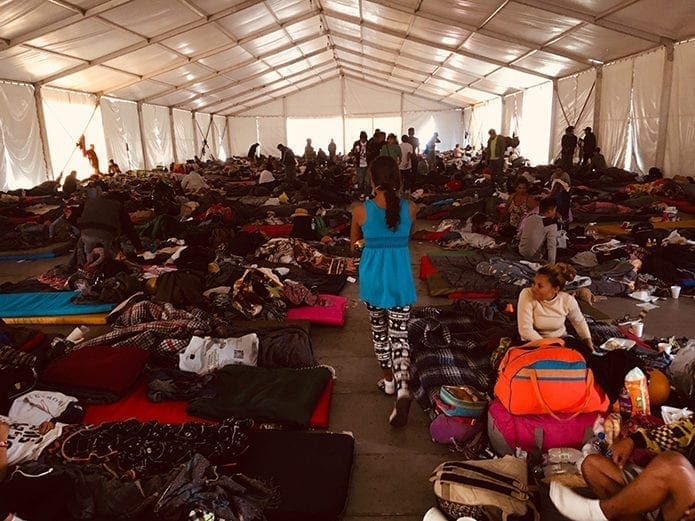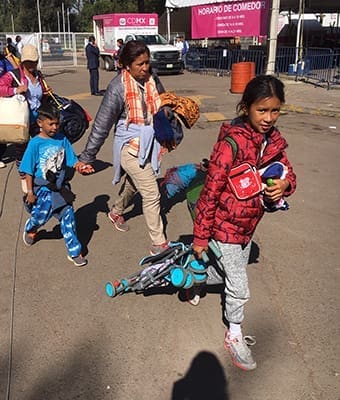 Photo Courtesy Tom Reichert
Photo Courtesy Tom ReichertShowing Mercy to Migrants
By TOM REICHERT, Special to the Bulletin | Published January 10, 2019
Through the years I’ve helped initiate sister parish relationships in countries such as Nicaragua, Honduras, Guatemala and Haiti. The purpose is to recognize our common humanity, nurture relationships, defend human dignity, work for development and to build up the kingdom of God.
In one day’s journey, a person awakens to a different language, culture, sounds and smells. Showers are cold, hunger is prevalent, medical care scarce and poverty is pervasive. Yet relationships are formed. Food is shared. Hopes for medical teams, clinics, water projects, building teams and schools are formulated and progressively realized. Satisfaction circulates, laughter abounds and the kingdom of God is at hand.
Do this long enough and a person comes to realize that people everywhere are basically good, filled with the same hopes for their loved ones as you and I. Yet questions arise, such as, “How many billions of people would risk life and limb just for a chance to have the same opportunity I was born into through no merit of my own?”
Suddenly I’ve become the rich person in the Gospel parables.
“The parable of the Good Samaritan offers two particularly important clarifications. Until that time, the concept of neighbor was understood as referring essentially to one’s countrymen … This limit is now abolished. Anyone who needs me, who I can help, is my neighbor.” -Pope Benedict, God is Love #15
Before leaving on a recent parish delegation to Guatemala, migrant caravans passing through Mexico became news. Another question arose: “What kind of desperation would lead a person to take what they can carry to seek asylum in a foreign country such as the United States where they most assuredly will not find welcome?”
Jesus among the marginalized
A friend and I decided to delay our return flight in Mexico City to seek them out. In a last-minute effort, we raised $7,000 from family, friends and parishioners. Some $4,000 was designated to a group of religious sisters walking with the first caravan providing medical care. The rest was used to buy large quantities of power bars, cookies, water, electrolyte drinks, and strollers, harnesses for carrying infants and ponchos to distribute. Funds were also given to Father Alejandro Solalinde, a Mexican priest providing care on the ground. In a country which has its own issues of poverty, it was heartening to witness such outreach from Catholic parishes, priests and sisters in Mexico.
Experience forms the eyes through which we filter reality. Jesus was born into a world which had no room at the inn. The Holy Family was forced to flee the “Massacre of the Innocents,” migrating to a foreign country to escape Herod’s wrath. Like children in the caravan, Jesus was dependent upon the love of God, the care of his parents and kindness from strangers.
As Jesus came to identify with the poor and the marginalized, he too would be marginalized and demonized. Is this Jesus the Son of God? Or is he a possessed blasphemer driving out demons by the “prince of demons?” Accept the latter narrative, and he can be imprisoned, tortured and crucified all done with “religious” justification for the “common good” of one’s country. In every human rights atrocity, we find that when a false narrative about a person or a people is perpetuated, great evil is done even by so-called “religious” people.

This mother and children were attempting to make a trip northward to seek asylum in the United States as part of a migrant caravan in Mexico City. During a last-minute effort, St. Joseph parishioner Tom Reichert and a friend raised money to help buy food, water and other supplies for the needy. Photo Courtesy Tom Reichert
A litmus test to virtue
To Jesus, our salvation is dependent upon what Pope Benedict and Pope Francis have called “the great criterion” or “When I was hungry, you gave me food, thirsty and you gave me drink, a stranger and you welcomed me, naked and you clothed me, ill and you cared for me, in prison and you visited me … whatever you did for the least of these … you did for me.” How one responds to this teaching is the moral litmus test to character and virtue. Jesus is the Good Shepherd who seeks out the vulnerable.
In a migrant tent, a person finds the hungry, the thirsty, the sick, and the stranger all in one place. This is where we must encounter Christ in a distressing disguise.
In his World Day of Peace message in 2000, St. John Paul II tells us: “Globalization, for all its risks, also offers exceptional and promising opportunities, precisely with a view to enabling humanity to become a single family, built on the values of justice, equity and solidarity. For this to happen, a complete change of perspective will be needed: it is no longer the well-being of any one political, racial or cultural community that must prevail, but rather the good of humanity.”
Refugees seeking safety in record numbers
The UNHCR reports that the world is presently in the worst refugee crisis since World War II with over 50 million displaced people. Like Cain, the question we all must answer is: “Are we our brothers’ keeper?” And what does it mean if we are?
Jesus couldn’t heal everyone or dispel all the poverty in the world he walked. No one individual, group or country can do it all, nor are we expected to. But like Jesus, we are all called to do our part.
“The Lord promises refreshment and freedom to all the oppressed of our world,” writes Pope Francis, “But he needs us to fulfill his promise. He needs our eyes to see the needs of our brothers and sisters. He needs our hands to offer them help. He needs our voice to protest the injustices committed thanks to the silence, often complicit, of so many.” (Homily Mass for Migrants, 2018)
Fifty years ago, St. Pope Paul VI said that if we want peace, we must work for justice and that development is the new name for peace. He also issued a warning to wealthier nations saying that: “Continuing avarice on their part will arouse the judgement of God and the wrath of the poor, with consequences no one can foresee.” (Development of the Peoples, #49) St. John Paul II put it another way: “Today, given the worldwide dimensions which the social question has assumed, this love of preference for the poor…cannot but embrace the immense multitudes of the hungry, the needy, the homeless, those without medical care and, above all, those without hope for the future … To ignore them would mean becoming like the ‘rich man’ who pretended not to know the beggar Lazarus at his gate.” (On Social Concerns, #42)
How to react?
Parishes can do their part by supporting Catholic Relief Services and by initiating a twinning relationship with the poorest parishes. Conversion and mutual transformation only happen in relationship.
Jesus had a different way of processing reality than worldly people leveraging power for narrow self-interest. As we journey through the seasons of life, each of us gets pulled further out to sea. One day each of us will arrive at our own border crossing from this life to the next. Suddenly we will become as vulnerable as any migrant at any border. Maybe we’ll find that the mercy we’ve shown others is the mercy we shall receive, that the way we judged others is the way we will be judged. Maybe one day we’ll find that the last really will be first.
Tom Reichert is the pastoral ministry/outreach coordinator at St. Joseph Church, Marietta.